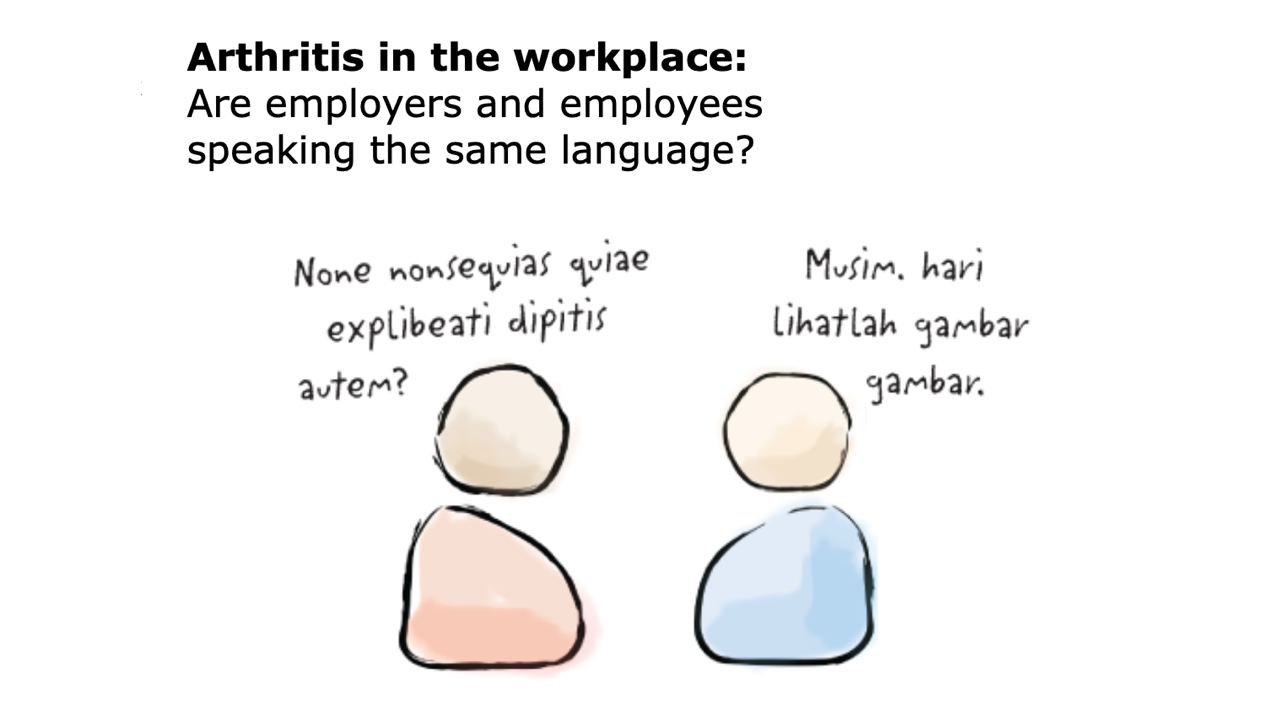
People with arthritis are more at risk for developing mental health issues because of the interaction of anxiety, depression, and fatigue with chronic arthritis pain. Arthritis Research Canada reports up to 70% of patients with rheumatoid arthritis experience anxiety and up to 38% experience depression; up to 40% of lupus patients experience anxiety and 30% experience depression.
Mental health and work
When it comes to mental health’s effects at work, 81% of #ACESurvey respondents said mental health has not affected them at work. Of the respondents who said mental health has affected them at work, the most common to least common responses were:
- Yes, I have had to take time off: 15%
- Yes, I have challenges keeping up with my work: 9%
- Yes, I have had to take unpaid time off work: 3%
- Yes, but I have received work accommodations from my employer: 3%
- All of the above: 3%
What respondents told us:
Q: Has your mental health ever affected you at work?
“I no longer work due to injuries from motor vehicle accidents. There was a point where my mental health became a part (although not the largest part) of the reason for my inability to return to work.”
– Indigenous respondent living with osteoarthritis
“Yes, I was fired from one job, struggled to find another job for years and now, I am struggling with keeping up with the challenges in my current job.”
– Woman living with osteoarthritis
Arthritis in the workplace
Arthritis is the most common cause of work disability in Canada, costing $13.6 billion per year, according to an estimate of the economic burden of arthritis by Statistics Canada – 1 in 136 workers has rheumatoid arthritis, the most disabling and costly type of the disease and that number will double in 30 years. In addition, studies have clearly shown that the cost of being present, but less productive, is higher than the cost of being absent, with a workforce survey showing the cost was four times higher than the cost of missed days from work.
Many Canadian workers struggle to find the right balance between work, family and personal responsibilities, particularly employees with chronic disease who are becoming an increasingly high proportion of the workforce due to aging, arthritis chief among them. Canadian employers who understand chronic disease, particularly the impact of a disease like arthritis, are implementing adaptations in their work environments to accommodate employees. Based on workplace insights shared by employees and company managers, ACE recognized the City of Ottawa and Aboriginal Peoples Television Network for their arthritis awareness, prevention and benefits practices in the workplace.
For employees living with arthritis, the struggle also involves balancing the demands of managing their disease and of working ‘around’ symptoms such as daily pain, fatigue, and joint dysfunction/immobility.
What kind of flexible work arrangements would help workers with arthritis and why?
| Flex time allows workers with arthritis to start and finish later, avoiding mornings that are particularly difficult due to increased pain and stiffness |  |
| Split shifts allow shorter consecutive hours of work, allowing opportunity for rest |  |
| Right to refuse overtime especially when disease is not well controlled, without fear of being judged as lacking motivation or commitment |  |
| Reduced hours is a common strategy used by workers with arthritis to remain employed, and partial leave is useful when dealing with flare-ups of arthritis |  |
| Flexible work locations are important for people with arthritis who get stiff and sore with immobility and find commuting difficult |  |
| Short term sick leave allows people to manage their disease during exacerbation of their arthritis or when dealing with surgeries or other complications |  |
| Educational leave allows some workers with arthritis to obtain additional training for responsibilities or job types that are better suited to having arthritis |  |
| Rest periods are particularly relevant to workers with arthritis to restore their energy and maintain their productivity |  |
| An important message for employers Workers with arthritis would be very receptive to any environment that recognizes their individual needs, makes these types of arrangements available to them for a variety of reasons, and helps reduce workplace stigma. |